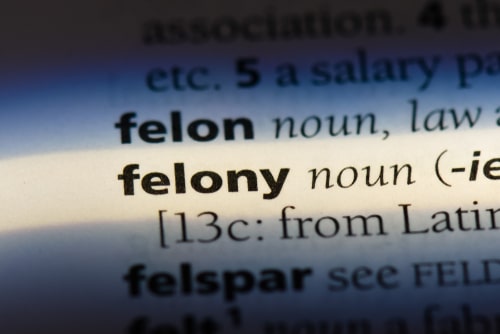2591 Dallas Parkway, Suite 207A, Frisco, TX 75034
Free Consultations
469-333-3333
 |
DO I HAVE TO GO TO TRIAL IN TEXAS? |
Recent Blog Posts
What Parents Should Do After a Child's Arrest
 As a parent, finding out that your child has been arrested can be deeply upsetting. Whether you suspected your child was doing things that put him at risk of getting arrested or thought that your child was a rule-follower, getting a phone call from the local police station can send you into a panic. Juveniles who get involved with the justice system often have options that adult offenders would not and usually have the opportunity to seal their records after reaching adulthood. However, you should still take your child’s arrest very seriously. The most important thing you can do is to immediately contact a Plano, TX juvenile criminal defense lawyer.
As a parent, finding out that your child has been arrested can be deeply upsetting. Whether you suspected your child was doing things that put him at risk of getting arrested or thought that your child was a rule-follower, getting a phone call from the local police station can send you into a panic. Juveniles who get involved with the justice system often have options that adult offenders would not and usually have the opportunity to seal their records after reaching adulthood. However, you should still take your child’s arrest very seriously. The most important thing you can do is to immediately contact a Plano, TX juvenile criminal defense lawyer.
Tips for Parents Whose Child Has Been Charged With a Crime
You are likely worried about everything from whether your child is safe right now to how this arrest could affect his chances at college admission. Some guidelines that may help include:
What to Do When The Police Arrive With a Search Warrant
 You are sitting in your house one day when there is a knock at the door. You hear the dreaded phrase, “Police- search warrant!” Your initial instinct might be to flee out the back door or to be quiet and pretend you are not home. While understandable, either of these reactions would likely cause more trouble. If you attempt to run, the police may believe that you are fleeing because you were committing a crime, in which case they may chase and detain you. If you pretend you are not home, they are likely to enter anyway and may be startled by your presence. A startled police officer who was not expecting you to be there may think that you were trying to take him by surprise and may respond violently. It is generally better to answer the door and call a Collin County, TX criminal defense lawyer as soon as you have the opportunity.
You are sitting in your house one day when there is a knock at the door. You hear the dreaded phrase, “Police- search warrant!” Your initial instinct might be to flee out the back door or to be quiet and pretend you are not home. While understandable, either of these reactions would likely cause more trouble. If you attempt to run, the police may believe that you are fleeing because you were committing a crime, in which case they may chase and detain you. If you pretend you are not home, they are likely to enter anyway and may be startled by your presence. A startled police officer who was not expecting you to be there may think that you were trying to take him by surprise and may respond violently. It is generally better to answer the door and call a Collin County, TX criminal defense lawyer as soon as you have the opportunity.
How Long Do I Have to Answer the Door?
Generally, it is best to respond immediately, either by opening the door at once or by calling out stating that you are coming. If there is a good reason why you cannot open the door instantly, it is best to explain why. For example, if you have a dog that is barking aggressively at the door, the police will very likely give you a moment to place your dog in its kennel for the safety of both your dog and the officers. Or, if you are getting out of the shower, the police officers may be willing to give you a brief moment to put clothes on.
Questions to Ask When You Are Charged With a Crime in Texas
 You have a lot to think about when you are facing criminal charges. You will need to consider the legal, practical, financial, and personal impact of your case and determine what your priorities are. A criminal case can have a far-reaching and long-lasting effect on your life, even if you are only facing a misdemeanor charge. It is important to speak with an experienced Allen, TX criminal defense attorney as soon as you possibly can. A lawyer can likely help you with everything from getting out of jail faster using an attorney writ bond to protecting your personal priorities, like keeping your license after a DWI or not losing your job.
You have a lot to think about when you are facing criminal charges. You will need to consider the legal, practical, financial, and personal impact of your case and determine what your priorities are. A criminal case can have a far-reaching and long-lasting effect on your life, even if you are only facing a misdemeanor charge. It is important to speak with an experienced Allen, TX criminal defense attorney as soon as you possibly can. A lawyer can likely help you with everything from getting out of jail faster using an attorney writ bond to protecting your personal priorities, like keeping your license after a DWI or not losing your job.
What to Think About When You Have Been Arrested
Some questions to ask yourself or your attorney after an arrest include:
- Am I eligible for an attorney writ bond? An attorney writ bond can get you out of jail in a matter of hours, even over the weekend. You may qualify to be released using an attorney writ bond if you are charged with a nonviolent misdemeanor.
When Your Spouse Calls the Police and Reports Domestic Violence in Texas
 You and your husband or wife got into a heated argument. It was the worst fight you have ever had. One or both of you was yelling or screaming. Whether or not there was any actual domestic violence involved, your neighbor overheard the dispute and called the police. Now there are police officers in your house, and they are separating you and your spouse to question both of you. You do not know what your spouse is going to say. Or, maybe it was your spouse who called the police and claimed that you assaulted him or her, and you know that the police are going to arrive soon. The best thing you can do is contact a Collin County criminal defense attorney as soon as you have the opportunity.
You and your husband or wife got into a heated argument. It was the worst fight you have ever had. One or both of you was yelling or screaming. Whether or not there was any actual domestic violence involved, your neighbor overheard the dispute and called the police. Now there are police officers in your house, and they are separating you and your spouse to question both of you. You do not know what your spouse is going to say. Or, maybe it was your spouse who called the police and claimed that you assaulted him or her, and you know that the police are going to arrive soon. The best thing you can do is contact a Collin County criminal defense attorney as soon as you have the opportunity.
What Not to Do When the Police Are Called for Domestic Violence
Knowing what not to do is just as important as knowing what to do. If the police respond or will respond to a domestic violence call, do not:
5 Types of Assault in Texas and the Gravity of Each Offense
 The term “assault” covers a broad range of violent crimes, ranging from relatively minor misdemeanors to serious felonies. Simple assault cases often stem from bar fights or minor disputes between friends or neighbors that lead to one party pushing the other. More serious assaults might involve the use of a weapon and serious bodily harm to the victim. If you are facing any type of assault charge, it is important to find a skilled Prosper, TX, criminal defense lawyer. Assault charges can sometimes be downgraded in seriousness or dismissed for lack of evidence when law enforcement did not witness the altercation.
The term “assault” covers a broad range of violent crimes, ranging from relatively minor misdemeanors to serious felonies. Simple assault cases often stem from bar fights or minor disputes between friends or neighbors that lead to one party pushing the other. More serious assaults might involve the use of a weapon and serious bodily harm to the victim. If you are facing any type of assault charge, it is important to find a skilled Prosper, TX, criminal defense lawyer. Assault charges can sometimes be downgraded in seriousness or dismissed for lack of evidence when law enforcement did not witness the altercation.
Types of Assault and Their Seriousness
Types of assault charges in Texas include:
- Simple assault - Misdemeanor assault is very easy to commit in the midst of an argument. Simply throwing a half-empty paper cup at your neighbor during an argument over parking could be considered an assault. No injury to the victim is required.
Motorcycle DWIs in Texas
 The same DWI laws that apply to all other motorists in Texas also apply to motorcycle riders. It is fairly common for several riders in a group to be charged at the same time, often on the way back from a motorcycle club event or group ride. Drinking and sometimes light drug use, like smoking marijuana, can be a part of motorcycle culture for some groups, while sobriety may be a focus for other groups. Unfortunately, drinking before or during group rides can lead to trouble. It might seem that there is less risk to the public when the impaired motorist is on a motorcycle - it is harder to injure others if you hit them while on such a small vehicle. However, the risk to the motorcyclist and others they are riding with may be extreme, so DWI laws are strictly enforced. If you have been charged with a DWI while riding a motorcycle, it is important to quickly contact a Plano, TX, motorcycle DWI attorney.
The same DWI laws that apply to all other motorists in Texas also apply to motorcycle riders. It is fairly common for several riders in a group to be charged at the same time, often on the way back from a motorcycle club event or group ride. Drinking and sometimes light drug use, like smoking marijuana, can be a part of motorcycle culture for some groups, while sobriety may be a focus for other groups. Unfortunately, drinking before or during group rides can lead to trouble. It might seem that there is less risk to the public when the impaired motorist is on a motorcycle - it is harder to injure others if you hit them while on such a small vehicle. However, the risk to the motorcyclist and others they are riding with may be extreme, so DWI laws are strictly enforced. If you have been charged with a DWI while riding a motorcycle, it is important to quickly contact a Plano, TX, motorcycle DWI attorney.
Fatal DWI Charges in Texas
 The most serious type of DWI charge in Texas is vehicular intoxication manslaughter. Vehicular intoxication manslaughter charges are brought when a drunk driver causes an accident that kills another person. It is a felony that can send someone to prison for years and change the course of their life in an instant. Fatal crashes are the worst possible outcome of drunk driving, and as such are punished the most harshly. Manslaughter generally means killing someone without intending to but while acting in a manner that creates a substantial risk of death for others. It is a step down from outright murder. If you are facing this extreme DWI charge, it is important to be represented by a highly experienced Frisco, TX, DWI defense lawyer.
The most serious type of DWI charge in Texas is vehicular intoxication manslaughter. Vehicular intoxication manslaughter charges are brought when a drunk driver causes an accident that kills another person. It is a felony that can send someone to prison for years and change the course of their life in an instant. Fatal crashes are the worst possible outcome of drunk driving, and as such are punished the most harshly. Manslaughter generally means killing someone without intending to but while acting in a manner that creates a substantial risk of death for others. It is a step down from outright murder. If you are facing this extreme DWI charge, it is important to be represented by a highly experienced Frisco, TX, DWI defense lawyer.
What Are the Penalties for Vehicular Intoxication Manslaughter in Collin County, TX?
People who have caused a fatal car crash while driving drunk face very serious legal penalties in Texas. If you are convicted, your sentence might include:
Collateral Consequences of a Felony in Texas
 The punishment a judge sentences you to after a felony conviction is called “legal consequences.” Legal consequences can include prison time, community service, a fine, and GPS monitoring or probation. Collateral consequences are anything else that happens to you as a result of a felony conviction. Like legal consequences, collateral consequences can vary tremendously based on the particular crime you were convicted of. While the legal consequences usually come with an end date, collateral consequences can follow you for the rest of your life. Your Frisco, TX, criminal defense lawyer can help you understand what life could look like after a felony conviction while fighting to help you avoid being convicted of a felony in the first place. Presenting a strong legal defense is the best way to minimize or avoid both legal and collateral consequences.
The punishment a judge sentences you to after a felony conviction is called “legal consequences.” Legal consequences can include prison time, community service, a fine, and GPS monitoring or probation. Collateral consequences are anything else that happens to you as a result of a felony conviction. Like legal consequences, collateral consequences can vary tremendously based on the particular crime you were convicted of. While the legal consequences usually come with an end date, collateral consequences can follow you for the rest of your life. Your Frisco, TX, criminal defense lawyer can help you understand what life could look like after a felony conviction while fighting to help you avoid being convicted of a felony in the first place. Presenting a strong legal defense is the best way to minimize or avoid both legal and collateral consequences.
The Unexpected Consequences of a Felony Conviction
Some of the collateral consequences you could face after a felony conviction include:
Options for Resolving Your Criminal Charges
 When you are facing criminal charges, you might feel like you have no options. There are a lot of new rules and orders you must suddenly obey. You must come to court when you are told to, or you may be arrested for failure to appear. If your crime involved a victim, you must stay away from that person and avoid contacting them in any way. You might be forced to wear a GPS monitor on your ankle, check in with a pretrial supervision officer, observe a curfew, or refrain from traveling out of the area. All of this might make you feel backed into a corner. It is important to know that you still have choices and you still have rights. A Plano, TX, criminal defense attorney can help you understand what your options for resolving your charges are so that you can make the right decision for you
When you are facing criminal charges, you might feel like you have no options. There are a lot of new rules and orders you must suddenly obey. You must come to court when you are told to, or you may be arrested for failure to appear. If your crime involved a victim, you must stay away from that person and avoid contacting them in any way. You might be forced to wear a GPS monitor on your ankle, check in with a pretrial supervision officer, observe a curfew, or refrain from traveling out of the area. All of this might make you feel backed into a corner. It is important to know that you still have choices and you still have rights. A Plano, TX, criminal defense attorney can help you understand what your options for resolving your charges are so that you can make the right decision for you
Your Choices When You Have Been Charged With a Crime in Collin County, TX
Going to trial is certainly one of your options, but it is not your only option by far. Some of the options you may have for resolving your criminal charges include:
Who Can Legally Use THC in Texas?
 Very few people can legally use any amount or type of THC products under Texas state law. While our state does offer a compassionate use program, the program is extremely limited in its application. Simply having a qualifying condition listed under the CUP laws does not mean that you are allowed to possess and use all cannabis products. You must apply for this program, receive a physician’s recommendation, and register properly before you are permitted to purchase, possess, and consume certain forms of low-THC products from state-licensed sources. Many individuals who use medical marijuana do not understand these regulations and accidentally run afoul of them. If you have been arrested for cannabis possession, a Collin County, TX, criminal defense lawyer can help you.
Very few people can legally use any amount or type of THC products under Texas state law. While our state does offer a compassionate use program, the program is extremely limited in its application. Simply having a qualifying condition listed under the CUP laws does not mean that you are allowed to possess and use all cannabis products. You must apply for this program, receive a physician’s recommendation, and register properly before you are permitted to purchase, possess, and consume certain forms of low-THC products from state-licensed sources. Many individuals who use medical marijuana do not understand these regulations and accidentally run afoul of them. If you have been arrested for cannabis possession, a Collin County, TX, criminal defense lawyer can help you.


 600+ DWI & CRIMINAL DEFENSE TRIALS
600+ DWI & CRIMINAL DEFENSE TRIALS
















